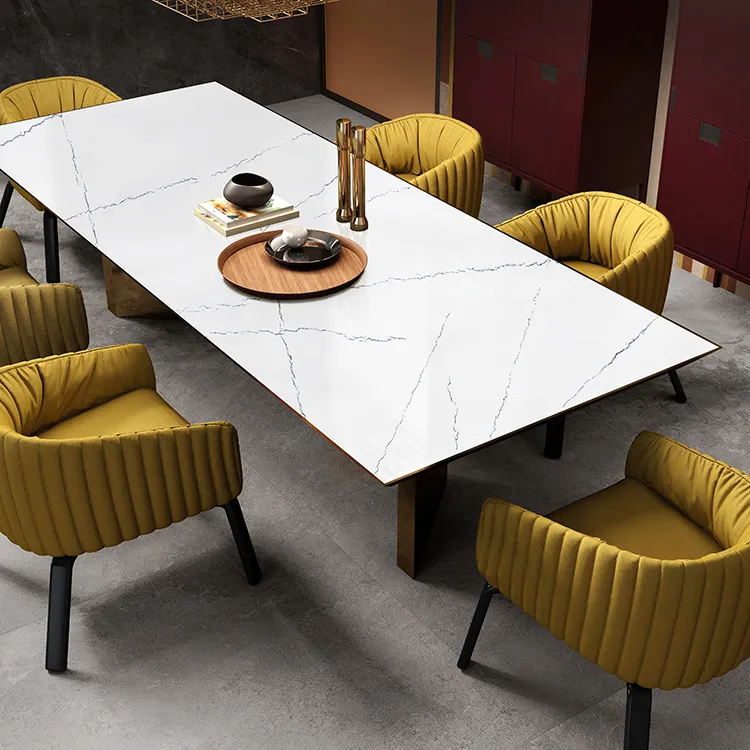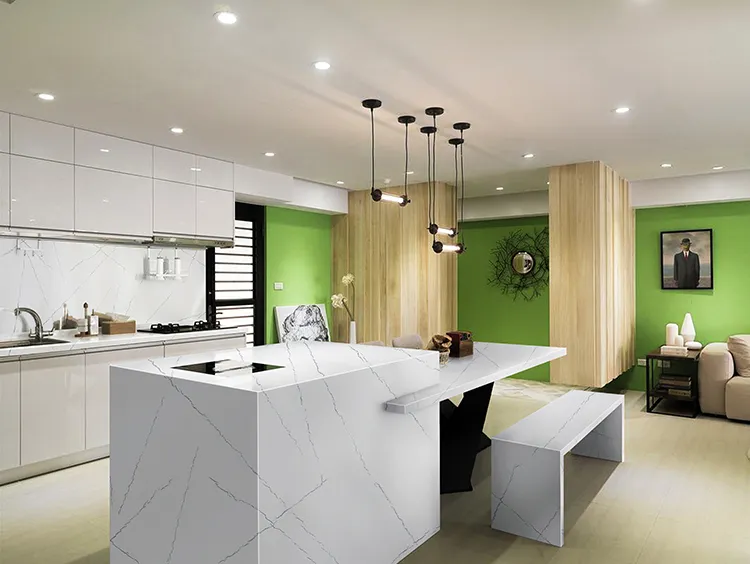With the ever-changing trends in modern kitchen and bathroom decoration, quartz and granite countertops have become the two major mainstream materials. However, when consumers choose, they often ask an important question: "Are quartz countertops easier to scratch than granite?" The answer to this question is not simple and needs to be analyzed from multiple aspects, including material composition, production process, hardness and usage environment.

Differences in material composition
First, we need to understand the nature of quartz and granite. Quartz countertops, commonly known as engineered stone, are made by mixing and pressing natural quartz crystals with resin binders. Depending on the formula of different brands, the quartz content is usually between 90% and 95%, and the remaining part is mainly polymer resins and pigments. Due to the composite nature of this structure, quartz countertops are able to provide a rich variety of color options and also have a high degree of consistency. The use of resin gives quartz countertops anti-fouling and waterproof properties, but its soft nature may also affect the wear resistance of its surface.
On the other hand, granite is a naturally formed igneous rock composed of a variety of minerals, mainly feldspar, quartz and mica. Each piece of granite is unique, with rich natural textures and color variations, which attracts many consumers. The high natural hardness of granite, especially its quartz component, makes its surface more durable.
Hardness and Scratch Resistance
Hardness is a key indicator for comparing the scratch resistance of quartz and granite. Mohs hardness is usually used to measure the scratch resistance of materials. The Mohs hardness scale ranges from 1 to 10, with 10 being the hardest substance.
1. The Mohs hardness of quartz, the main component of quartz countertops, is 7, which means that the quartz crystal itself has strong scratch resistance. However, the resin component of quartz countertops has a lower hardness, about 3 on the Mohs hardness scale. This results in the actual scratch resistance of quartz countertops not being entirely determined by the hardness of the quartz crystal, but being affected by the resin part. Therefore, although quartz countertops have relatively good scratch resistance, their surface may still be scratched if exposed to objects that are too sharp or harder.
2. The hardness range of granite depends on its mineral composition, generally between 6 and 7. Since granite is a pure natural stone, its surface hardness is uniform, and there is no problem of different hard and soft areas like in quartz countertops. This means that the scratch resistance of granite is generally more stable and is not easily scratched due to the softening of individual components.
Therefore, from the perspective of hardness, the overall scratch resistance of granite is slightly better than that of quartz countertops, especially when facing sharp objects, the surface of granite is less likely to be scratched.
The influence of surface treatment
The surface treatment process of the countertop will also have a significant impact on scratch resistance. Quartz countertops and granite countertops are usually polished to obtain a smooth surface. This polishing treatment can provide certain protection in the short term, making the countertop less susceptible to scratches in daily use. However, after a period of use, the polished surface may become more easily scratched due to the accumulation of pollutants such as oil stains and dust, which reduces its smoothness.
The surface of the quartz countertop is relatively denser, and the effect of resin makes it have advantages in anti-fouling and anti-penetration, which also indirectly provides it with certain protection and reduces the chance of scratches. On the contrary, although granite has a high hardness, due to its tiny internal pores, it may absorb liquid or dirt during use, resulting in the need for regular sealing treatment to maintain its smooth surface.
The impact of the use environment on the scratch resistance of the countertop
Whether it is a quartz countertop or a granite countertop, the daily use environment will directly affect its risk of scratching. As one of the most frequently used places for countertops, the kitchen is often exposed to hard objects such as knives, pots, and tableware. Any improper operation may cause scratches on the countertop.
1. Quartz countertops are generally considered to be a relatively easy-to-maintain material in daily use. However, due to the presence of its resin component, quartz countertops are easily scratched if you are not careful when using knives or other sharp tools. Although minor scratches can be repaired by a certain amount of polishing, deep scratches may require a more complex repair process.
2. Granite countertops have good wear resistance when used due to their hard mineral composition. Even in a high-intensity use environment such as the kitchen, granite countertops are not easily scratched by knives and other objects. However, the natural texture and fine pores on the granite surface may be penetrated by grease and dirt without regular maintenance, which will lead to a decrease in the overall finish of the countertop, indirectly increasing the possibility of scratches.
In environments such as bathrooms where there is relatively little contact with hard objects, the scratch resistance difference between quartz countertops and granite countertops is not obvious, and it is more reflected in the aesthetics and stain resistance of the materials.

Daily maintenance and repair
Daily maintenance of countertops is also one of the important factors affecting scratch resistance. Reasonable cleaning and maintenance can effectively reduce the occurrence of scratches and extend the service life of countertops.
Quartz countertops are relatively simple to maintain and do not require frequent sealing treatment. They only need to be wiped with mild detergent and soft cloth on a daily basis. Since quartz countertops have good anti-permeability, daily water stains and oil stains are not easy to penetrate into the countertops, so the possibility of scratches during use is low. However, quartz countertops are more sensitive to high-temperature objects. Therefore, during cooking, care should be taken to avoid placing overheated pots directly on the quartz countertops to prevent surface damage or softening, thereby increasing the risk of scratches.
Although granite countertops are not easy to scratch, their porous structure means that they need to be sealed regularly to prevent stains from penetrating. Sealing not only maintains the finish of the countertop, but also enhances its scratch resistance to a certain extent. For minor scratches, granite countertops can be repaired by grinding and polishing, but deep scratches may require professional repair tools to handle.
Visual impact of scratches
Although the actual depth and range of scratches may not be large, their visual effect is often a headache. Especially on the smooth surface of the countertop, even small scratches may appear very obvious.
Due to its resin composition, when scratches appear on quartz countertops, the scratched part may show a different reflective effect from the surrounding area, causing the scratches to appear more obvious, especially in a bright light environment. In addition, the color and texture of quartz countertops are usually more consistent, and any slight surface changes will be easily detected.
The natural texture and color changes of granite countertops are more complex, which makes small scratches not easy to detect. Even if there are minor scratches, the surface texture of granite can cover them well, so that the overall visual effect will not be greatly affected.

Conclusion: Are quartz countertops easier to scratch than granite?
Considering multiple factors such as material composition, hardness, usage environment and daily maintenance, quartz countertops are indeed easier to scratch than granite under certain conditions. The presence of its resin component makes its overall hardness slightly lower than that of granite, especially when facing sharp objects. Granite, as a natural hard stone, has better scratch resistance, but needs to be sealed regularly to prevent other damage.
Foshan Rongguan Glass Material for Building Co., Ltd. stands out as a leader in the building materials industry. We manufacture top-grade quartz stone and artificial marble surfaces, blending modern technology with timeless design. Buyers worldwide benefit from our competitive pricing, customized options, and attractive promotions on bulk orders. Partner with us for all your building material needs.

